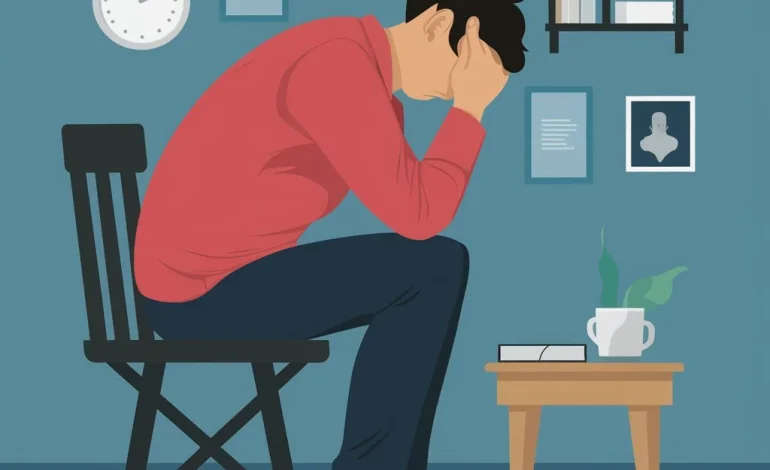Who Is Most At Risk For Depression In Men?

Depression affects men as a mental health disorder, causing ongoing sorrow, lack of enthusiasm, and emotional disconnection. It can impair daily functioning and overall health.
For effective support and treatment, it is vital to understand which men are in the greatest danger of developing depression. Depression in men can affect anyone, but certain risk factors may increase their vulnerability. This would allow us to improve our management as well as to avert the disease through the identification of these issues.
The problem of depression among men is profound enough not to be disregarded. For various reasons, male individuals are more at risk when it comes to this condition compared to others. The identification of the people who are at the highest risk will assist in availing appropriate help and treatment meant for them.
Demographic Factors
One of the key factors contributing to depression in men is age. The younger generation of men may encounter distinct triggers when compared to their older counterparts. Each age bracket carries with it its share of challenges that may have an impact on mental well-being.
Depression tends to be influenced by socioeconomic standing in males. Financial instability and job stress can increase vulnerability. Living conditions, whether in urban or rural areas, can further influence the risk.
Genetic and Biological Factors
Here are some bullet points:
- Family History: Progenitors who experience mood disorders such as anxiety or sadness could lead to an increased likelihood of having the same problems.
- Hormonal Imbalances: Men with hormonal alterations can experience depression symptoms in men.
- Neurotransmitter Levels: Men have been associated with depression as a result of deficiencies in their brain chemicals.
- Genetic Predisposition: Some genes can lead to greater vulnerability of males towards depression.
- Brain Structure: The impact of male depression can be influenced by variations in brain design and operation.
- Medical Conditions: There may be situations whereby men may experience depression as caused by chronic illnesses or conditions.
Psychological and Behavioral Factors
Psychological and behavioral factors play a significant role. Traits such as high self-criticism or perfectionism can increase vulnerability. Additionally, past trauma and ongoing stress often contribute to the development of depression. Substance abuse also commonly exacerbates the risk.
Social and Environmental Factors
Social and environmental factors can significantly impact. Isolation and lack of a support network often worsen the condition. Workplace stress and relationship problems are common triggers. Living conditions and social dynamics also play a crucial role.
Cultural and Societal Influences
Cultural and societal influences shape depression in men in various ways. Striving for traditional male roles may mean refusing help. Moreover, attitudes towards psychological health have created hurdles in this regard. Finally, culture is an important lens through which the availability of mental health services can be assessed.
Prevention and Intervention
Prevention and intervention strategies are vital for managing depression in men. To enhance results, it is crucial to detect early signs and reach out for help without hesitation. The assistance of relatives, comrades, and therapists cannot be overlooked in this process. In most instances, therapy, counseling, as well as changes in one’s way of life comprise
Historical and Evolutionary Perspectives
When it comes to men, historical and evolutionary perspectives are often considered to gain a deeper understanding. Much has changed in the way people think about depression since time immemorial.
Some factors cited as possible reasons for evolutionary changes are sometimes referred to as risks explained by evolution. Therefore these perspectives need to give answers to the challenges today’s men face.
Case Studies and Real-Life Examples
Case studies and real-life examples illustrate depression through personal stories. Individual experiences highlight various risk factors and coping mechanisms. Imparting effective treatment and support means analyzing these cases, which provides us with important insights.
Frequently Asked Questions FAQS
Who is most at risk for depression in men?
Men with a family history of depression are at higher risk.
How does age affect depression in men?
Different age groups experience unique risks for depression in men.
Does socioeconomic status impact depression in men?
Yes, financial instability and job stress can increase risk.
Can hormonal changes affect depression?
Hormones that are not balanced can lead men to experience feelings of depression.
Also Read: 6 Essential Vitamins For Optimal Bone Health
Conclusion
For you to assist effectively, you must have a complete understanding of what is most likely to put men into depression. The main indicators are biological age, socioeconomic status, and family background. One can emphasize preventive and intervention-related measures as a way of shoring up these hazards. Consequently, emotional wellness could be improved upon by taking cognizance of these danger zones.
It’s possible to offer more individualized assistance by acknowledging the distinct difficulties that render males more susceptible to despondency. There is a combination of mental, social, and biological causes altogether determining the risk. Better understanding and onset of treatments can have far-reaching impacts. To understand and address these risks is the primary step in effective management.









